David Bicskei, Hungary (he/him)
18 September 2025
My name is David Bicskei, I'm 21 years old. I study at university to be an English language teacher and a Hungarian literature teacher, and on the weekends, I work as a receptionist.
How is studying going?
I really like it. Last year I was studying to be a computer science engineer, but I did not really like that because I'm more of a human kind of person and I needed the social interactions to, just, progress in life. So, I chose to leave that kind of major and after half a year I gave in my application to this teacher’s course, and I got accepted and now I'm more happier with life in general.
Can you tell me like how it was growing up in that village where you come from?
That village is actually a bubble. That's my most fanciest word for it because even though it is a homogenic Gypsy village, you don't meet a lot of people, like, from different kinds of varieties, if you could say that. It's not a very diverse community. So, the only people I see – white people – when I was smaller was when we went to the city to do some shopping. It's called Siklós. Siklós is the nearest city to our village, and one time we got called names when I was smaller and I asked Mom, “Why is that? Like, why are they being rude to us?” and she told me about racism for the first time. That was like when I was six years old or something, and I actually felt like really horrible that people think in such a way about people of colour.
And you like – for example that that was very, very young when that happened – had you ever perceived yourself as a ‘people of colour’?
Never. Never actually, because I was between people of colour. So, I thought it was normal that…and I've seen people of other colour in movies and in such a way, but I never thought about it that people would discriminate someone just because they have different skin colour or they have different cultural settings or anything else.
And it was a shock to you, that.
Yeah, I actually felt really...how do you say that? Like, sorry for the world because they just closed them off from the opportunity to get to know people of colour because we are not bad people [laughs].
Okay. can you tell me like in general, how was your life when you were younger?
It had a lot of struggles. Like, my family struggled a lot financially, but we were always a loving family, and I think that was what kept me alive actually, and sane at the time.
It was really hard to grow up in such settings because people did not, were not very well coming to us…but…and I also went to Junior School in the village next to us, and the fun part was that the people from our village went to that school in the next village. So, I’d never seen new people. So, I went from a bubble to a bubble. So, I did not get exposed to these kind of harsh things as much as I needed to progress with this view of me and others.
Okay. and do you remember the period when you started to view yourself different, not different, like you are not interested in this, this, this, like other people in regard to your sexual orientation. Do you remember that period?
Yeah, of course. I first noticed a difference in me when I was like really young. I watched a cartoon, I forgot the name of it, but I, I fell in love with the main character who was also male, but I was also attracted to women. So, I was really confused. But I did not know that there are different kind of sexualities because I never met them. I, I, I lived in a bubble so that I think that it’s self-explanatory why I didn't know anything about this kind of stuff. So, I always thought that I was different, but I did not say that out loud because I didn't feel the need to. My family were loving me. We did not talk about such things, but they were accepting everything about me.
That was my next question, was there somebody that you could talk to from your family members, friends about that, or you had to keep it to yourself?
I never felt the need to talk about it with my family. I came out in high school to my friends. It was a really hard thing to do so because there was quarantine before and I had a lot of time to think about the, this kind of stuff in my room alone, and I realised there's, there's some things are different with me and I've cried a lot about it, and I was in denial at first because I was in a mindset that it is acceptable for others to do it, but it is not for me. So, I was homophobic with myself and only myself and I had a lot of work to do with that. So, after we came back to school after quarantine, I came out to one of my best friends and I was trusting her and she was really accepting and she was really understanding with me about this whole situation, and she said that she knew, she just didn't say it out loud. And after that I started to come out to more of my closest friends, and by the end of the week, I already… everyone knew from my high school I was a really famous person [laughs] not to be bragging, but, but by the end of the week, everyone knew that I had a different kind of sexual orientation, and I started, it started the chain reaction. So, a lot of other people started to come out and the school actually became a safe place for everyone just because I came out. So, it brought some changes, and everyone was welcoming with me and I felt heard for the first time about my sexual orientation.
Do you remember that feeling? What happened to you when you first came out to your friend? Can you describe to us?
I remember the few minutes before me coming out and I felt like I was holding a really big weight on my shoulders and it was also pushing on my heart, and I, I was on the verge of crying, crying to my friend. But after I said it out loud, I felt so much more relieved, and I felt so much better about myself, and after my friend was accepting about this situation, I felt even better.
Can we talk about being people of colour, in this regard it’s Roma, and being LGBTQ? Was it hard for you to put…did you see yourself as Roma, like Roma cannot be LGBTQ or something? Or you literally didn't care about it, that you are Roma?
My high school was also a Roma High School so I never felt that I was any different from them, even though there are different kinds of Roma in that school, I never felt that I was separated from them in any sort.
And if people think that I am any different – and I'm not only talking about high school, this is my mindset and I told you – if anyone thinks that I'm a threat to them or I'm any different than them, then I will just…I don't care about them, because why would you think that I am any different? Like, I'm a person. Give me a chance. If you don't want to, then don't. I don't need you in my life. Also, like, it's not my job to make you more accepting. If you are open to meeting new people, then I'm here for it. But if you have any judgements against me, then you don't need me. I'm not here to change your opinion.
And what did your family think about this? Like, did you come out to your family or?
Not yet, but my family were always accepting to me and the one time my mom mentioned that what if I bring home a boy, but not in a rude way, rather in a playing way with me, you know, like I always had like my relationship with my parents are not only child and parents, we are more like friends. For example, my mom also studies at Pécs, to be a nurse, and we meet up like twice a week at Pécs and we go out to eat, we gossip with each other and have some lovely chatting with each other. So, it's never been like a strict parent relationship with my mom or dad.
Did you have any problems now in Pécs because you are a person of colour and gay in your community?
Like problems, like real problems?
Like racism, like, something like that.
Of course, it usually happens. One time people spit in front of me and stuff like this [laughs]. But I, I just don't care, you know, I, I have more friends than…my, my, my friend's opinion is more valuable to me than a strangers and they don't care about them.
Do you feel like protected and free here in Hungary, in Budapest or in Pécs, as a person of colour and as a person of the LGBTQ community?
Protected by others?
Not protected, like, do you feel like threatened? Do you [feel that you] can speak normally, speak freely, walk normally, walk freely?
In general, you will get looks, that's for sure, and there are some instances where you… it might be physical harm. But if you don't fear it and you don't… it depends on the person, as I realised, if people look at you… [people] which respect that you have this kind of vibes that you are a respectable person, you will never get these kinds of problems in my opinion.
Okay, and about your Roma community back in your home village, do they know now about you and you coming out?
So, I think they know, but they did not hear anything from me…yet.
And you still haven't talked to them about this?
No, but not because I fear to come out, because everyone around me at Pécs knows that I'm not straight, but I do not feel the need to tell them because I know that their world view is much narrower and maybe it is not…it's not able to fit in their world view. They have their own struggles, their own problems and I don’t want to be another hassle to them. But they would be accepting. There was also a lesbian couple in our village and people at the first they were like, [gasps] “Oh my God.” But they were, they accepted it, like two days later so…and there wasn't any big conflict about it.
We heard that – heard – there were problems with being Roma and being in the LGBTQ community. Have you experienced that kind of problems being a Roma in the LGBTQ community?
My experience was not negative. It was more positive, because Gypsy communities or Romani communities are more diverse than others. So, I think it depends actually, because if there are, there are really these… how do you say that? People who follow old habits that they got from their grandparents, for example, they're not that accepting. But my home community in my village, we are more accepting, I think because we are a diverse community. Of course we are people of colour, and there's a lot of musicians also, and people I don't know, we have a more easier mindset about these kinds of things.
What do you think that we have to know about Roma and the LGBT community in Hungary that I didn't ask? Do you think there is something important to know about Roma and LGBTQ in Hungary?
A lot of Roma are LGBTQ persons also. That's all I want to say. Even if they are closeted, they live their LGBTQ+ life in a closeted way because they fear to come out.
Double discrimination is a thing. So, they are already Roma, they already get discriminated. If they would also come out as a different sexual orientation than straight, they will get double discriminated which they do not want, and I, I know a lot of people around me, even at Pécs who doesn't even tell their friends that they are not straight just because they are also Roma and they have this minority complex in them because we got…people who did not grow up in a Gypsy or Roma community, they have this minority complex and it's really strong in them. So, they always feel like they are less for the society than anyone else with a lighter, white colour or skin colour. So…but it, it works together and we have to… how do you say that, hold them? Like, for example, me, if I come out, maybe there's a chance that they will come out. You know? The thing is that I cannot be suppressed. This is my personality. Everywhere I go, I will be there, and if you do not want to see me, just close your eyes because it's your problem and not mine.
And this is the last question, we ask everybody this question, what do you think makes a human being a human being?
To live the present, because people always go just straight without looking up and looking around themselves. They just follow the narrative and they never, they fear to have their voices heard by anyone else. They always join, join the public voice and they do not feel the need… or no, they fear to be little bit different than others because they feel judgement. Never feel judgement.
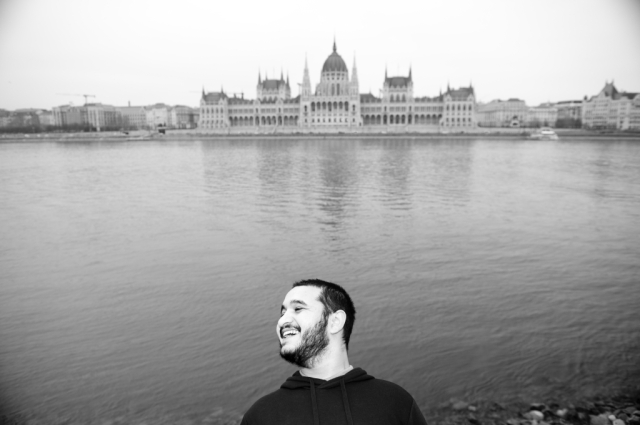 |
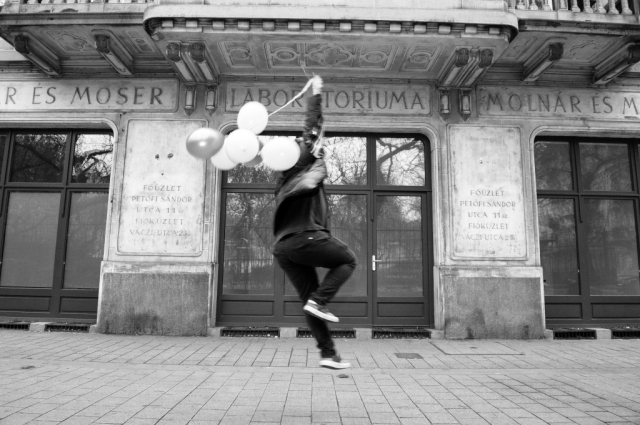 |
||
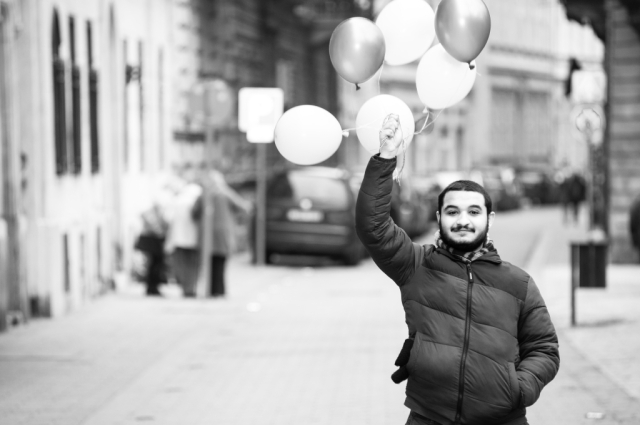 |
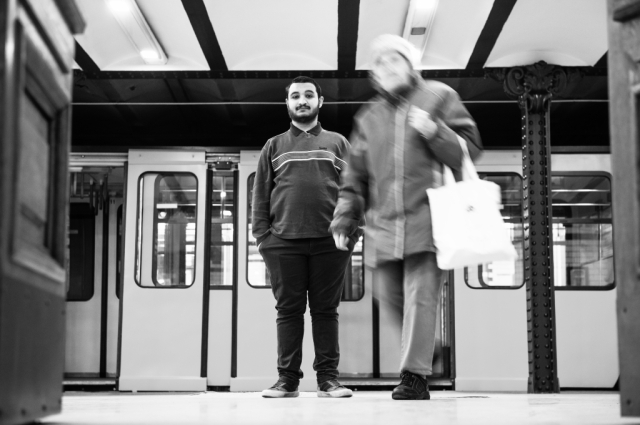 |
||
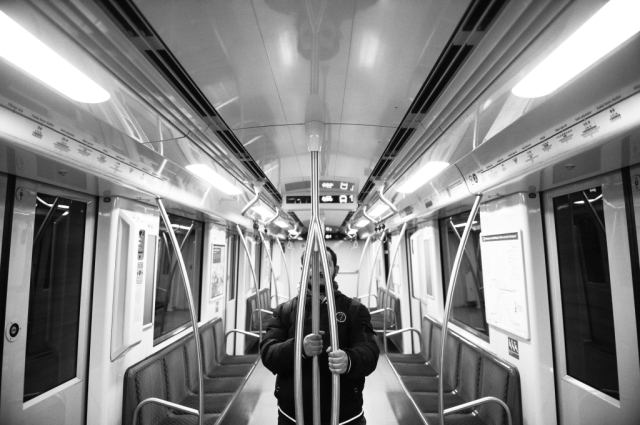 |
Click here to listen to other interviews.




